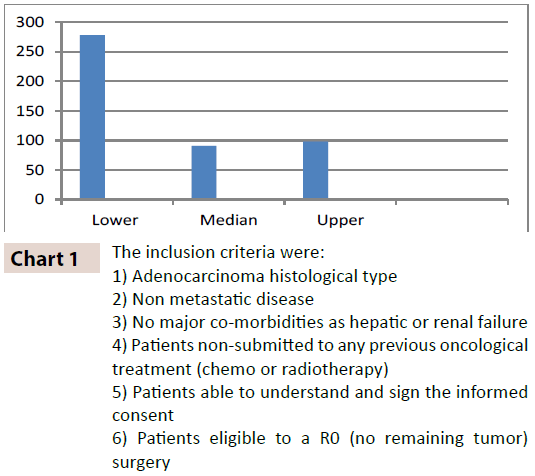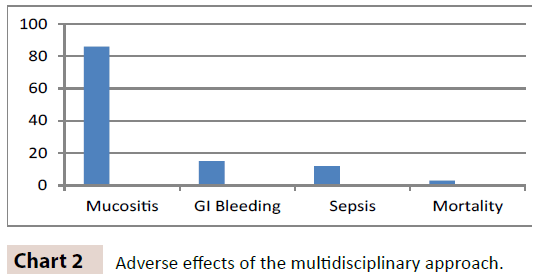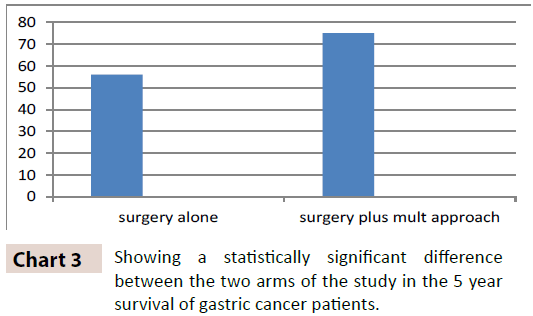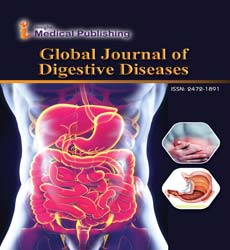Multidisciplinary Treatment of Gastric Cancer, Results in Ten Year Experience of a Brazilian Center: Southern Trial
Weston AC, Giordani D, Cereser C, Menguer R, Laporte G, Roth A, Albrecht B, Assumpção J and Weschenfelder R
DOI10.4172/2472-1891.100020
Weston AC1*, Giordani D1, Cereser C1, Menguer R1, Laporte G1, Roth A1, Albrecht B1, Assumpção J2 and Weschenfelder R3
1Santa Casa de Porto Alegre, Brasil
2Universidade Luterana do, Brasil
3Hospital Moinhos de Vento, Brasil
- *Corresponding Author:
- Antonio C Weston
Medical Director of the Medical Residency in General Surgery of Santa Casa de Porto Alegre, Brazil
E-mail: drweston@terra.com.br
Received date: January 22, 2016; Accepted date: February 15, 2016; Published date: February 22, 2016
Citation: Weston AC, Giordani D, Cereser C, et al. Multidisciplinary Treatment of Gastric Cancer, Results in Ten Year Experience of a Brazilian Center: Southern Trial. Int J Dig Dis. 2016, 2:1. doi:10.4172/2472-1891.100020
Abstract
Gastric Adenocarcinoma remains one of the leading worldwide causes of cancer. Despite the improvement in the surgical techniques the results of a surgery as a single treatment remains poor. Since 2001 the multidisciplinary and oncological approach has been indicated to gastric adenocarcinomas showing better results. A total of 422 patients were divided in two arms, 245 were treated with surgery plus adjuvant or neodajuvant therapy and 147 with surgery alone. In conclusion the result was a significant better overall survive in 5 year in the arm of the multidisciplinary approach.
Introduction
Gastric Cancer is still one of the leading causes of death in the world. According to the National Institute of Cancer, 20.000 new cases are expected to be diagnosed in Brazil in 2016, and it will be the fifth leading cause of Cancer death due to the high mortality of this disease [1].
In recent years, we have seen a decline of the incidence of tumors in the lower part of the Stomach. However, tumors located in the upper part of the Stomach and Cardia is increasing.
Since 2005 we have started a study based on the SWOG 116 protocol of Mac Donald proposing an adjuvant treatment of resected lesion [2]. In 2007 we have extended this protocol to upper tumors proposing a neo adjuvant treatment according to the proposal of the Magic Trial [3].
The aim of this study is to verify the impact of the multidisciplinary approach in the overall survival of the patients and the pitfalls of this approach.
This study was submitted and approved by the Ethical Committee of Santa Casa de Porto Alegre.
Patients and Methods
Since 2005 we were able to include 467 patients diagnosed with Gastric Adenocarcinoma in the study.
Male patients were 321 and female patients were 146, the same distribution between genders we see in the literature. The ages ranged from 27 to 84 with a median age of 59 years old.
Most of the patients, 278, had tumor of the lower part of the stomach. The patients diagnosed with Cardia and the upper part tumor was 98. The remaining patients, 91, were diagnosed with tumors in the median part of the stomach as we see in Chart 1
Chart 1: The inclusion criteria were:
1) Adenocarcinoma histological type
2) Non metastatic disease
3) No major co-morbidities as hepatic or renal failure
4) Patients non-submitted to any previous oncological treatment (chemo or radiotherapy)
5) Patients able to understand and sign the informed consent
6) Patients eligible to a R0 (no remaining tumor) surgery
As a routine we underwent a staging video laparoscopy before the definitive treatment. We excluded or lost 45 patients due to difficulties in follow-up, remaining a total of 422 cases. Patients who were able to be resected in the R0 mode in the lower and median part of the stomach were headed to adjuvant chemotherapy with 5 -Fluororacil plus Leucovorin followed by radiotherapy. Patients with tumors in the upper part of the stomach were referred to neoadjuvant chemotherapy with Cysplatin and 5-Fu, 4 sessions.
A total of 245 patients were eligible to adjuvant or neoadjuvant therapy and 147 were referred to surgery as a single treatment. The distribution of ages, gender and stages between the two groups were similar.
Results
From the total number of cases, 67 (13%) were excluded due to any kind of intolerance or major toxicity.
Adverse effects we have seen are:
1) Severe mucositis - 86 cases (25%)
2) Febrile leucopenia- 34 cases (9%)
3) Gastrointestinal Bleeding - 15 cases (3%)
4) Sepsis -12 cases (2, 8%)
5) Mortality - 3 cases (0, 9%)
Adverse effects of the Multidisciplinary approach as we can see in Chart 2
The overall survival was 57% in 5 years in the surgery isolated arm and 75% in the multidisciplinary treatment arm. These results had a statistically significant difference (0.05) as we can see in Chart 3
Discussion
Since 2001 when McDonalds et al published their Intergroup protocol we observed a worldwide trend indicating a multidisciplinary approach as a standard treatment. However, despite the positive results for this kind of approach, we observed many pitfalls due to the toxicity caused by these schemas [3-5]
We were able to decrease toxicity after we started nourishing our patients better before surgery with a routine supplementary diet based on protein and extra calorie support [6]
In 2006 the Magic Trial proposed a neo adjuvant treatment addressed to gastro esophageal tumors as a better approach and we were able to detect the same in our patients.
This trend was confirmed in 2011 in the Cross trial when a better overall survival was achieved in patients submitted to multidisciplinary treatment [7]
Many other studies as Fazio, Shimada and Kumar came to confirm that results are better despite Geographical differences and social realities of the patients [8-10].
Conclusion
Gastric adenocarcinoma patients had an increased overall survival with a multidisciplinary approach. Though significant toxicity is observed, it can be diminished if the nutritional status of the patient is optimized.
References
- National cancer Institute of Brazil (2016) National Guidelines for Cancer in Brazil.
- Matsunaga M, Fukahori M, Ushijima T, Miwa K (2015) Trousseau's syndrome in a patient with gastric cancer. BMJ
- Shimada H, Fukagawa T, Haga Y, Oba K (2015) Does remnantgastric cancerreally differ from primary gastric cancer? A systematic review of the literature by the Task Force of Japanese Gastric Cancer Association. Gastric Cancer.
- Lin MT (2015) Peri-Operative Care for Gastrectomy to Enhance Recovery. J Nutr Sci Vitaminol 61: S115.
- Cravo M, Fidalgo C, Garrido R, Rodrigues T, Luz G, et al. (2015) Towards curative therapy in gastric cancer: Faraway, so close! World J Gastroenterol 21: 11609-11620.
- Setia N, Clark JW, Duda DG, Hong TS, Kwak EL, et al. (2015) Familial Gastric Cancers. Oncologist 20: 1365-1377.
- Gockel I, Hoffmeister A, Lordick F, Chirurg (2015) Neoadjuvant therapy for tumors of the upper gastrointestinal tract: Complication management. 86: 1014-1022.
- Elimova E, Ajani JA (2015) Surgical Resection First for Localized Gastric Adenocarcinoma: Are There Adjuvant Options?J Clin Oncol 33:3085-3091.
- Grushina TI (2015) The indications for medical rehabilitation of certain oncological patients presenting with the complications of the radical treatment under the conditions of a multi-disciplinary hospital.Vopr Kurortol Fizioter Lech Fiz Kult 92:57-61.
- Chadwick G, Groene O, Taylor A, Riley S, Hardwick RH, et al. (2015) Management of Barrett's high-grade dysplasia: initial results from a population-based national audit. Gastrointest Endosc. S0016-5107: 02754-02756.
Open Access Journals
- Aquaculture & Veterinary Science
- Chemistry & Chemical Sciences
- Clinical Sciences
- Engineering
- General Science
- Genetics & Molecular Biology
- Health Care & Nursing
- Immunology & Microbiology
- Materials Science
- Mathematics & Physics
- Medical Sciences
- Neurology & Psychiatry
- Oncology & Cancer Science
- Pharmaceutical Sciences



